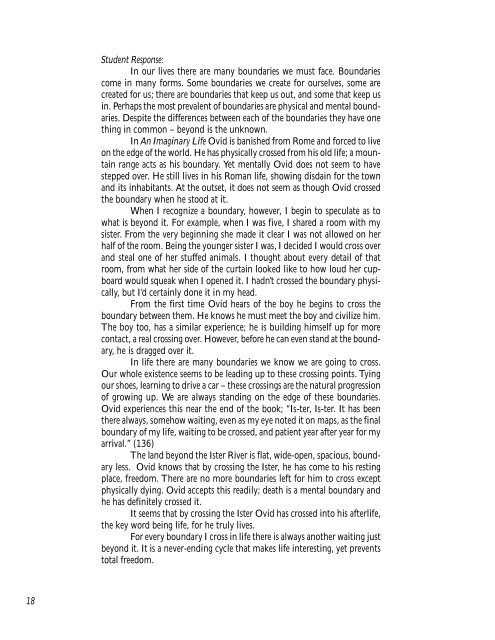Colloquium on English - Research Institute for Waldorf Education
Colloquium on English - Research Institute for Waldorf Education
Colloquium on English - Research Institute for Waldorf Education
Create successful ePaper yourself
Turn your PDF publications into a flip-book with our unique Google optimized e-Paper software.
18<br />
Student Resp<strong>on</strong>se:<br />
In our lives there are many boundaries we must face. Boundaries<br />
come in many <strong>for</strong>ms. Some boundaries we create <strong>for</strong> ourselves, some are<br />
created <strong>for</strong> us; there are boundaries that keep us out, and some that keep us<br />
in. Perhaps the most prevalent of boundaries are physical and mental boundaries.<br />
Despite the differences between each of the boundaries they have <strong>on</strong>e<br />
thing in comm<strong>on</strong> – bey<strong>on</strong>d is the unknown.<br />
In An Imaginary Life Ovid is banished from Rome and <strong>for</strong>ced to live<br />
<strong>on</strong> the edge of the world. He has physically crossed from his old life; a mountain<br />
range acts as his boundary. Yet mentally Ovid does not seem to have<br />
stepped over. He still lives in his Roman life, showing disdain <strong>for</strong> the town<br />
and its inhabitants. At the outset, it does not seem as though Ovid crossed<br />
the boundary when he stood at it.<br />
When I recognize a boundary, however, I begin to speculate as to<br />
what is bey<strong>on</strong>d it. For example, when I was five, I shared a room with my<br />
sister. From the very beginning she made it clear I was not allowed <strong>on</strong> her<br />
half of the room. Being the younger sister I was, I decided I would cross over<br />
and steal <strong>on</strong>e of her stuffed animals. I thought about every detail of that<br />
room, from what her side of the curtain looked like to how loud her cupboard<br />
would squeak when I opened it. I hadn’t crossed the boundary physically,<br />
but I’d certainly d<strong>on</strong>e it in my head.<br />
From the first time Ovid hears of the boy he begins to cross the<br />
boundary between them. He knows he must meet the boy and civilize him.<br />
The boy too, has a similar experience; he is building himself up <strong>for</strong> more<br />
c<strong>on</strong>tact, a real crossing over. However, be<strong>for</strong>e he can even stand at the boundary,<br />
he is dragged over it.<br />
In life there are many boundaries we know we are going to cross.<br />
Our whole existence seems to be leading up to these crossing points. Tying<br />
our shoes, learning to drive a car – these crossings are the natural progressi<strong>on</strong><br />
of growing up. We are always standing <strong>on</strong> the edge of these boundaries.<br />
Ovid experiences this near the end of the book; “Is-ter, Is-ter. It has been<br />
there always, somehow waiting, even as my eye noted it <strong>on</strong> maps, as the final<br />
boundary of my life, waiting to be crossed, and patient year after year <strong>for</strong> my<br />
arrival.” (136)<br />
The land bey<strong>on</strong>d the Ister River is flat, wide-open, spacious, boundary<br />
less. Ovid knows that by crossing the Ister, he has come to his resting<br />
place, freedom. There are no more boundaries left <strong>for</strong> him to cross except<br />
physically dying. Ovid accepts this readily; death is a mental boundary and<br />
he has definitely crossed it.<br />
It seems that by crossing the Ister Ovid has crossed into his afterlife,<br />
the key word being life, <strong>for</strong> he truly lives.<br />
For every boundary I cross in life there is always another waiting just<br />
bey<strong>on</strong>d it. It is a never-ending cycle that makes life interesting, yet prevents<br />
total freedom.

















